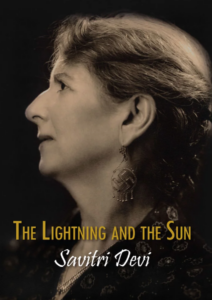and the Sun, 7

Adolf Hitler’s second and even more shattering experience of the horror of the present Age began on the 10th of November 1918, as he stood, half-blind from the effects of poisonous gas, among his wounded comrades in a hospital hall at Pasewalk in Pomerania, and heard from the clergyman the latest news: the ‘November revolution’ and Germany’s capitulation; the tragic end of the first World War.
More than four years before, he had joined the war with enthusiasm, as a volunteer in a Bavarian regiment, not in an Austrian one, clearly showing thereby that he was prepared to die anytime for the German people and ‘for the Reich that embodied them,’[1] though not for ‘the State of the Habsburgs’—that artificial State of many nationalities. For he considered the war in no way as an Austrian concern, but as a struggle of the German people (including, naturally, those of Austria) ‘for their existence’[2]—as a just war. And, he had done his duty thoroughly; faithfully. And although he had, for months already, (especially since the general strike of 1917) been fearing —feeling—that some diabolical traitors’ intrigues were being carried on to rob the German front-soldier of a victory which he well deserved, yet he had not expected such an end, and so suddenly….
The grief, the indignation and temporary despair that took him over as he abruptly acquired ‘the most horrible certitude in his life’[3] are so eloquently described in Mein Kampf that nothing can throw more light upon the future, Führer’s state of mind than an extensive, quotation of his own words:
I could not remain any longer’ (i.e. remain hearing the news). ‘While my eyes once more stared into darkness, I sought my way back to the dormitory, threw myself upon my bed, and buried my burning head under the quilts and pillows.
Since the day I had stood before my mother’s grave, I had not wept. When, in my youth, Destiny had been mercilessly harsh to me, I had faced it with growing defiance. When during the long years of the war, death had taken many a dear comrade and friend of mine from our ranks, it would have seemed to me nearly a sin to complain—for they had died for Germany. And when, in the days of the terrible struggle, the slowly advancing gas had taken me in its grip, and begun to gnaw into my eyes, and when the fear of becoming blind for ever had made me feel, for a second, as though I would weaken, the voice of conscience had thundered to me: ‘Miserable wretch! You feel like weeping, while thousands are faring worse than yourself!’ And I had put up with my lot in silence. But now I could not help weeping. Now I experienced how completely every personal suffering fades away before the misfortune of one’s Fatherland.
So, it had all been in vain! In vain all our sacrifices, and all the hardships we had endured; in vain, hunger and thirst, for months without end; in vain, the hours in which, facing the terror of death, we had yet done our duty; and in vain, the death of two million men! Would not the graves of the hundreds of thousands who had gone forth full of faith in the Fatherland, never to return, break open and release the dumb heroes covered with mud and blood,—release them as revengeful spirits among the people at home, who had treated so disdainfully the highest sacrifice which a man can offer his country? Had they died for that, the soldiers of August and September 1914? Had the regiments of volunteers, in the autumn of the same year, followed for that the elder comrades? Had those boys of seventeen sunk for that into Flanders’ earth? Was that the object of the sacrifice that German mothers had brought the Fatherland when, with a grieving heart, they had sent the boys to their duty, never to see them, again? Had all that happened in order to enable, now, a handful of criminals to set their grip upon the Fatherland?!! … The more I tried, then, to think clearly about the monstrous event, the more my forehead burnt with indignation and shame. What was all the pain I felt in my eyes, compared with this wretchedness?
What followed, were appalling days and still worse nights. I knew that all was lost. Only fools—fools or … liars and criminals—could put their hope in the enemy’s mercy. During those nights, hatred grew in me, hatred against the originators of that deed.
In those days, I also became aware of my destiny. Now, I could only laugh at the thought of my own future, that had caused me such bitter worry only a short time before. Was it not ridiculous to build houses upon such foundations as this? At last it was clear to me that the very thing which I so often already had feared, without ever being able, in my heart, to believe it, had now happened.
Emperor William the Second had been the first German emperor to hold out his hand to the leaders of Marxism, in a gesture of reconciliation, without knowing that rascals have no honour. While they still held the Emperor’s hand in one of theirs, their other one was already seeking for the dagger.
With Jews, no pactising policy is possible, but only that of the hard ‘either—or.’
‘I decided to become a politician.’ [4]
This heart-rending autobiographical account could—historically—be described as: the passage of National Socialism from the stage of an expectant or latent incarnate Idea, to that of an active one.
Surely the incarnate Idea is, when not as old as Adolf Hitler himself, at least as old as his earliest awakening to socio-political, nay, to philosophical consciousness in general. And that took place very early: already in Linz, when not before. Yet, then, and in Vienna, although his interest in social and political problems grew and grew with the daily experience of injustice and misery, and still in Münick, after 1912, the future ruler continued to think of himself primarily as of a future architect. There may have been moments, of course, in which he thought, or at least felt, differently. There were such moments—one such moment at least, and a great one,—already in his life in Linz, if we are to believe Kubizek’s account of it.[5] But the artist’s immediate goal soon reappeared. Horrible as—in Vienna, at any rate—many of them doubtless were, the experiences of daily life were not sufficiently appalling to push it out of sight altogether. Nay, during the war, when more and more aware of the necessity of opposing to the forces of international Socialism a national organisation which would be free from the weaknesses of the Parliamentary system, Hitler had begun to think seriously of becoming politically active, he had merely visualised himself speaking in public ‘while carrying on his profession.’[6] Now, his profession, nay, his art,—for he still was, and could but remain, fundamentally, an artist,—was out of question. Every activity which was not to contribute directly and immediately to free Germany from the consequences and specially from the causes of defeat, was, out of question; and that, not merely because Adolf Hitler loved Germany above all things, but because that more-than-human intuition that classes him among the few great seers of mankind, told him that Germany’s real, deeper interest was—is, absolutely,—the real interest of Creation;—the ‘interest of the Universe,’ again to quote the immortal words of the Bhagavad-Gita. (And it is not an accident,—not a mere coincidence,—that I, a non-German Aryan intimately connected with England, Greece and India, should stress this fact. It is a sign; a symbol; the first expression of the homage of worldwide Aryandom to the latest Man ‘against Time’ and to the truly chosen Nation).
Out of the abyss of powerless despair—from that bed of, suffering upon which the nameless corporal Adolf Hitler lay weeping over Germany’s fate while his blinded eyes burned in their sockets, like red-hot embers; out of his appalling certitude that ‘all was lost,’ that ‘all had been in vain’—rose the defiant Will to freedom and Will to power of an invincible people and, beyond that, and greater than that, the perennial cosmic Will to Perfection in all its majesty; the will of the German soldier who had fought in Flanders and—identical to it; expressing itself through it,—the impesonal and irresistible Will of the eternal Warrior and Seer above Time and ‘against Time’; the Will of Him Who comes back age after age, ‘when all is lost,’ ‘when evil rules supreme,’ to re-establish on earth the reign of Righteousness.
From then onwards, the age-old Struggle for Truth—the Struggle ‘against Time’—was, in the West, to enter a new phase. It was to identify itself with the political struggle to free Germany from the bondage imposed upon her by the victors of 1918, no less than with the more-than-political one against the causes of physical and moral decay that were—and still are—threatening the existence of the natural aristocracy of the Aryan race. And the National Socialist German Labourers’ Party—the famous N.S.D.A.P., which Adolf Hitler soon evolved out of the tiny group of idealists (seven, including himself) originally called Deutsche Arbeiter Partei, which he joined in 1919—was to be the one agent of the everlasting Force of Light and Life amidst the growing darkness of the Dark Age. I say: the one; for, contrarily to all other so-called movements of regeneration, religious and secular, this political and yet infinitely more than political Movement, attacked the very root of historical decay as such: biological decay, consequence of sin against the primary natural Commandant of blood purity; in other words (from the standpoint of original Perfection), sickness; tangible, physical untruth and that moral untruth (that false conception of ‘man’) which stands to the back of it.
________________
[1] Mein Kampf, p. 179.
[2] Ibid., p. 178.
[3] Ibid., p. 222.
[4] Ibid., pp. 223, 224-225.
[5] Kubizek, pp. 140 and following.
[6] Mein Kampf, p. 192.








